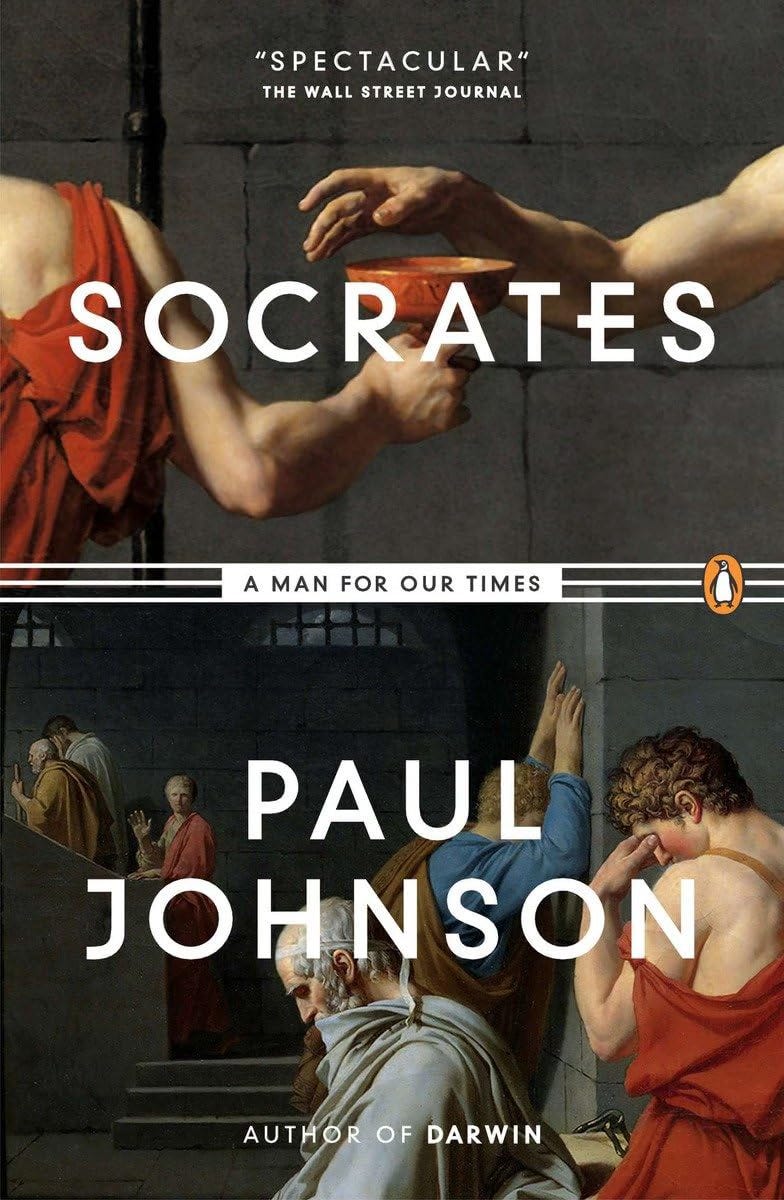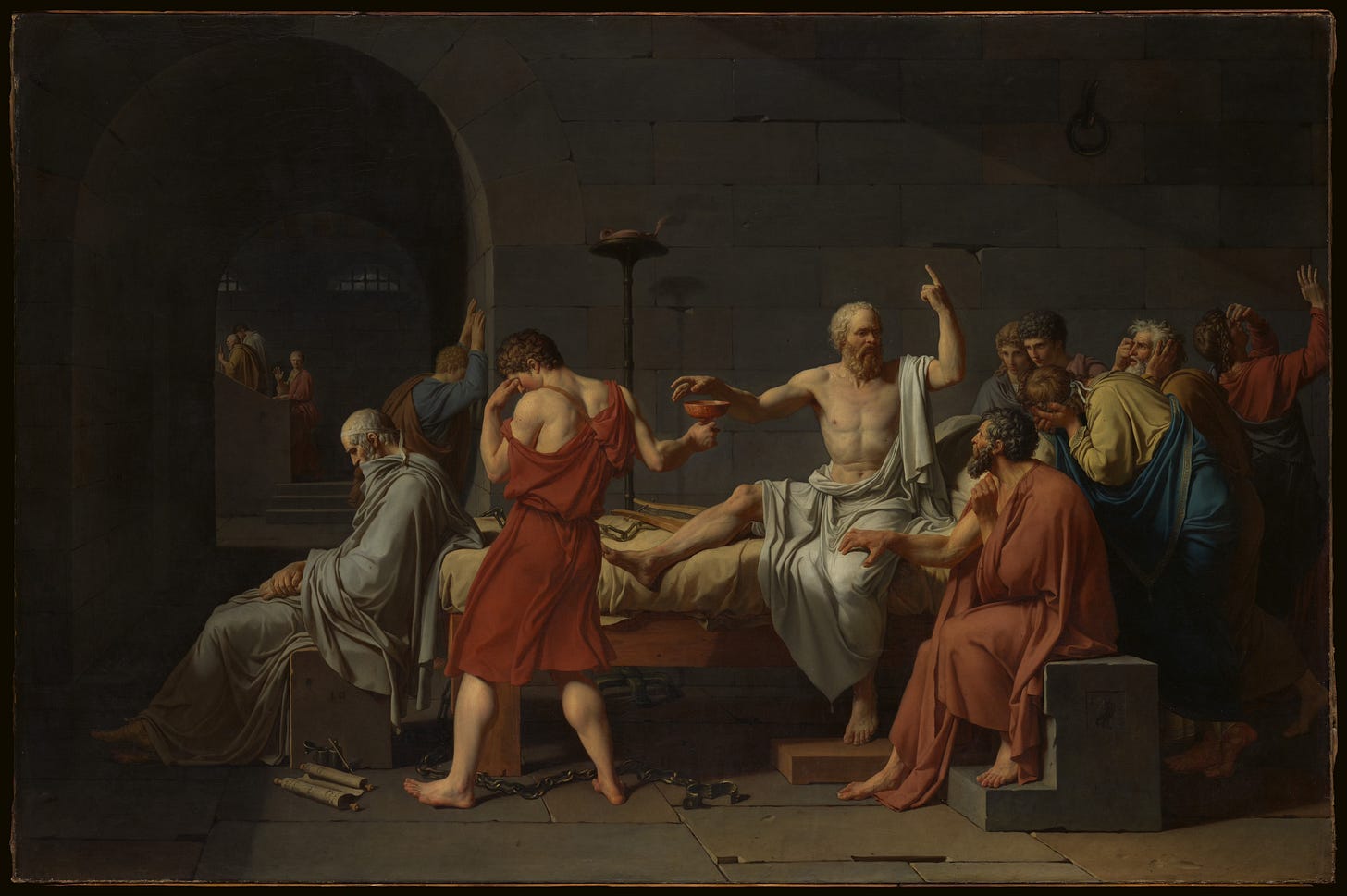Socrates: A Man for Our Times
Paul Johnson's concise biography of Socrates provides a sweeping overview of the life of an extraordinary man and the Athenian society that he couldn't live without.
“People who are excited by posthumous fame forget that the people who will remember them will soon die too. And those after them in turn. Until their memory, passed from one to another like a candle flame, gutters and goes out.”
— Marcus Aurelius, Meditations, Book 4, Section 19
The sad reality is that most of us will be forgotten a century from now.
Even those who have risen to the top of their professions and achieved fame during their lifetimes will inevitably fall into obscurity in short order. When Marcus Aurelius made this point in his private journal, he probably thought that he would be among those who are forgotten in the mists of time, even though he was arguably the most powerful man in the western world during his life.
But there are notable exceptions to this general rule.
Marcus Aurelius continues to influence millions of people today, more than eighteen centuries after his death. Marcus is one of just a handful of men from antiquity who continue to resonate in our daily lives, at least for those who have read his work.
Socrates (470 BC - 399 BC) is perhaps an even better example of a man who has had an enduring influence, and that’s in spite of the fact that did not leave a written record of any kind. Far from being an emperor, Socrates lived a simple life as a citizen of his beloved Athens. Thanks to the writings of Plato and Xenophon, the world continues to benefit from the wisdom of Socrates twenty-four centuries after his death.
I recently read several of Plato’s famous dialogues in which Socrates holds forth on a variety of topics. In The Apology, Socrates makes a lengthy defense of his life and conduct when he is put on trial after decades as an intellectual who roamed the streets of Athens examining his fellow citizens. In The Republic, Socrates seeks the truth regarding the perennial question of how one should define justice.
Socrates did not establish a school and never charged any fees to students, unlike the sophists who taught in Greece during his lifetime, many of whom became wealthy and famous. He was simply a curious man interested in learning more about human nature and sought to improve not only himself but those around him through dialogues in which he examined the logic of his interlocutors. Unfailingly polite, Socrates had a large following but also irritated powerful people. This ultimately led to his demise.
Whenever we lack primary sources, we are forced to rely on the accuracy of reporters. If we did not have the written words left to us by Plato and Xenophon, we would know little or nothing about Socrates today, but thanks to them, the candle has never gone out. The question, however, is how much of what we know about Socrates today is an accurate portrayal of the real man. Secondary sources, even well written accounts prepared in good faith, inevitably lead to a loss of fidelity.
Plato was twenty-nine years old when Socrates was executed in 399 BC. As a student of Socrates, Plato clearly put him on a pedestal and there are few reasons to question the accuracy of The Apology in which Socrates makes his impassioned defense at trial and refuses to go into exile rather than face execution. However, Plato lived nearly another half century after his mentor died and became a towering figure in his own right. In several of Plato’s dialogues, scholars question whether the real, historical Socrates is speaking for himself or has become a mouthpiece for Plato.
Paul Johnson tackles this question head-on in his concise biography, Socrates: A Man for Our Times, which I decided to read after reading several of Plato’s dialogues. My objective was to better understand the historical Socrates rather than just the version of the man revealed to us by Plato. Paul Johnson was most well known as a “popular historian” who produced short biographies of famous historical figures. His book was a perfect solution for my purposes rather than a longer academic treatise.
Johnson wastes little time blowing the whistle, so to speak, on Plato using Socrates as a vehicle to spread his own ideas:
“In his earlier writings Plato presented Socrates as a living, breathing, thinking person, a real man. But as Plato’s ideas took shape, demanding propagation, poor Socrates, whose actual death Plato had so lamented, was killed a second time, so that he became a mere wooden man, a ventriloquist’s doll, to voice not only his own philosophy but Plato’s. Being an intellectual, Plato thought that to spread his ideas was far more important than to preserve Socrates as historic, integrated human being.
Using Socrates as an articulate doll was, he saw, the easiest way to bring about this philosophical dispersal. So the act of transforming a living, historical thinker into a mindless, speaking doll — the murder and quasi-diabolical possession of a famous brain — became in Plato’s eyes a positive virtue. That is the only charitable way of describing one of the most unscrupulous acts in intellectual history.”
Johnson goes so far as to accuse Plato of creating a Frankenstein monster with his ends-justifies-the-means manipulation of his mentor’s memory to propagate philosophical ideas that Socrates never opined on. Johnson laments that it is difficult to spot the line of demarcation between Plato’s portrayal of the real Socrates and “the monster,” noting that this debate has been going on for centuries.
Fortunately, there are clues regarding Socrates that provide glimpses of the real man since he was well-known in Athens and often the subject of the famous playwrights of the era. Men who lived in the subsequent centuries, such as Cicero, Seneca, Plutarch, Lucian, St. Augustine, and Tertullian, had access to written material about Socrates that was later destroyed and is unknown to us. Johnson’s book is an attempt to piece together some of these clues in addition to using Plato’s work as an important source.
Johnson felt that it was important to set the stage, so he provides a useful description of the political situation in Athens during the fifth century BC, along with how the wars of the period influenced Socrates and his contemporaries. The Peloponnesian War, fought between 431 BC and 405 BC, was a ruinous period for Athens, ultimately ending with the victory of Sparta and the temporary abolition of Athenian democracy in favor of rule by a group of oligarchs hand-picked by the Spartan victors.
During the war years, Socrates lived as he always had, wandering the streets barefoot, clothed in simple garments, engaging ordinary people in dialogue. He was physically unattractive but distinctive and recognized by nearly everyone in Athenian society. Never confrontational or insulting, he liked most people and tended to be viewed as “clever” by the public. His habit of examination, however, inevitably insulted those with thin skins who did not take kindly to being exposed as empty suits.
Socrates also taught several of the political and military leaders during the decades of the Peloponnesian War and, when tyranny descended on Athens after the Spartan victory, Socrates was suspected as being complicit with the oligarchs who he had relationships with. Socrates knew nearly everyone in Athens, so naturally he knew some people of ill repute. But complicity with the oligarchy was never proven.
Socrates held unconventional beliefs for his time, particularly on the definition of justice, as I wrote about in more detail recently after reading the first two books of The Republic. Then and now, the principle of retribution was more popular than the idea of turning the other cheek. Socrates died four centuries before Jesus Christ began his ministry, so there was no religious or philosophical precedent for what Socrates was saying. The idea that it is not just to harm one’s enemies would have been entirely foreign in an age of jealous Gods who frequently sought retribution for themselves!
During his trial, Socrates was also accused of atheism, but Johnson believes that Socrates believed in God, just not in the multitude of the Gods of Greek Mythology. Johnson believes that Socrates “takes a simple view of the soul, immortal and unified, which Christians share.” He believed that God could not be the cause of evil, as we can see in the second book of The Republic, and that humans should not practice evil, even against enemies, and even when we have been grievously wronged.
“[Socrates] had a simple view of the body and the soul and their relationship. The body was the active, physical, earthly aspect of a person and was mortal. The soul was the spiritual aspect and was immortal. The body was greedy for pleasure and material satisfactions, was selfish, and if not kept under control, became a seat of vice. The soul was the intellectual and moral side of the person, which had a natural propensity to do right and to improve itself. It could be, with proper training, the seat of virtue.”
When it came time to accept his fate, Socrates acted with equanimity, rejecting Crito’s offer to help him escape, believing that violating the laws of Athens would be a fate far worse than death. For Socrates, life without Athens was not worth living. I discuss additional details regarding his view of death in my article on The Apology and Crito.
As I proceed with the Great Books, I am finding myself disagreeing with the notion that these books “speak for themselves,” at least to those of us who have been the product (victims?) of contemporary education. Unless you already know a great deal about history, how is it possible to approach ancient texts and profit from them fully?
We can certainly glean context from the Great Books, but if we do not know the basic facts that the authors assumed we would know, we will necessarily miss a great deal. Books like Johnson’s biography of Socrates and Edith Hamilton’s books on Ancient Greece and Mythology have been very helpful as I proceed with my reading project.
If you would like to listen to a review of Socrates: A Man for Our Times by Paul Johnson, I recommend David Senra’s discussion in Episode #252 of Founders Podcast.
The Death of Socrates by Jacques Louis David, 1787
From the Metropolitan Museum of Art:
“In this landmark of neoclassical painting from just before the French Revolution, David took up a classical story of resisting unjust authority in a sparse, friezelike composition. The Greek philosopher Socrates (469–399 BCE) was convicted of impiety by the Athenian courts; rather than renounce his beliefs, he died willingly, expounding on the immortality of the soul before drinking poisonous hemlock.
Through a network of gestures and expressions, David’s figures act out the last moments of Socrates’s life. He is about to grasp the cup of hemlock, offered by a disciple who cannot bear to witness the event. David consulted antiquarian scholars to create an archeologically exacting image, including details of furniture and clothing. His inclusion of Plato at the foot of the bed, however, deliberately references not someone present at Socrates’s death but rather the author whose text, Phaedo, preserved this ancient story.”
Copyright, Disclosures, and Privacy Information
Nothing in this article constitutes investment advice and all content is subject to the copyright and disclaimer policy of The Rational Walk LLC. The Rational Walk is a participant in the Amazon Services LLC Associates Program, an affiliate advertising program designed to provide a means for sites to earn advertising fees by advertising and linking to Amazon.com.





